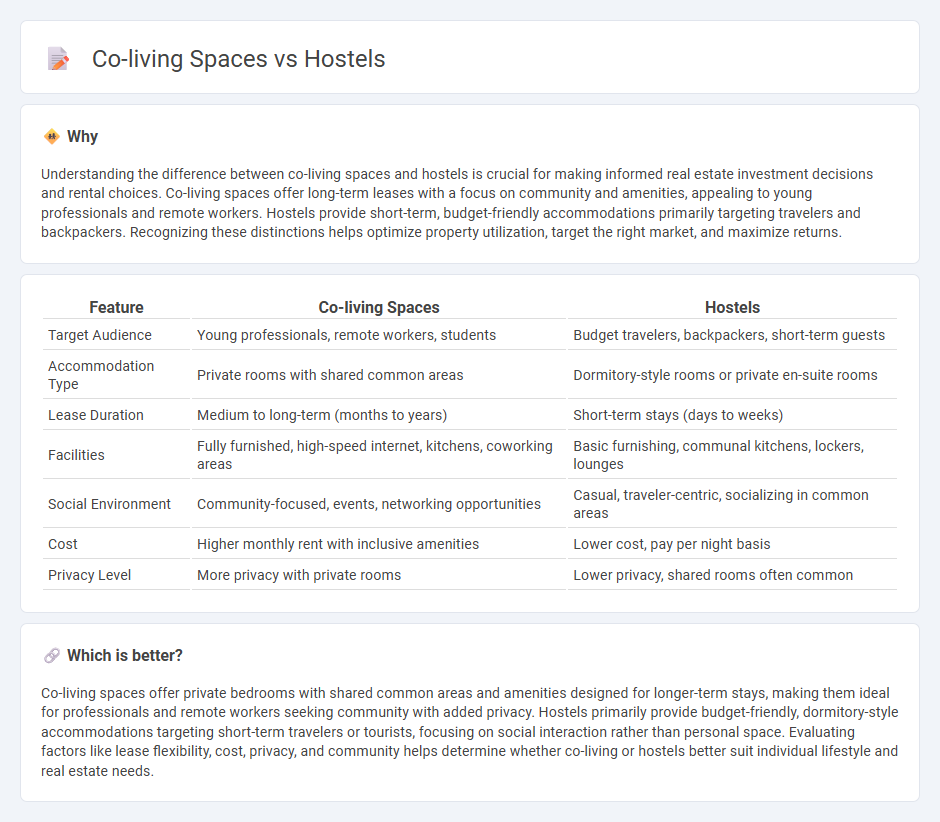
Co-living spaces offer private rooms with shared amenities designed for long-term stays, fostering a community atmosphere ideal for young professionals and digital nomads. Hostels typically provide budget-friendly dormitory-style accommodations geared toward short-term travelers seeking social interactions. Explore the key differences and benefits of co-living spaces versus hostels to choose the best fit for your lifestyle and needs.
Why it is important
Understanding the difference between co-living spaces and hostels is crucial for making informed real estate investment decisions and rental choices. Co-living spaces offer long-term leases with a focus on community and amenities, appealing to young professionals and remote workers. Hostels provide short-term, budget-friendly accommodations primarily targeting travelers and backpackers. Recognizing these distinctions helps optimize property utilization, target the right market, and maximize returns.
Comparison Table
| Feature | Co-living Spaces | Hostels |
|---|---|---|
| Target Audience | Young professionals, remote workers, students | Budget travelers, backpackers, short-term guests |
| Accommodation Type | Private rooms with shared common areas | Dormitory-style rooms or private en-suite rooms |
| Lease Duration | Medium to long-term (months to years) | Short-term stays (days to weeks) |
| Facilities | Fully furnished, high-speed internet, kitchens, coworking areas | Basic furnishing, communal kitchens, lockers, lounges |
| Social Environment | Community-focused, events, networking opportunities | Casual, traveler-centric, socializing in common areas |
| Cost | Higher monthly rent with inclusive amenities | Lower cost, pay per night basis |
| Privacy Level | More privacy with private rooms | Lower privacy, shared rooms often common |
Which is better?
Co-living spaces offer private bedrooms with shared common areas and amenities designed for longer-term stays, making them ideal for professionals and remote workers seeking community with added privacy. Hostels primarily provide budget-friendly, dormitory-style accommodations targeting short-term travelers or tourists, focusing on social interaction rather than personal space. Evaluating factors like lease flexibility, cost, privacy, and community helps determine whether co-living or hostels better suit individual lifestyle and real estate needs.
Connection
Co-living spaces and hostels share a fundamental connection in providing affordable, community-oriented real estate options tailored to transient or young urban populations. Both leverage shared amenities and flexible lease terms to maximize space efficiency and foster social interactions among residents. The rising demand for communal living solutions in metropolitan areas drives the growth of co-living and hostel markets within the real estate sector.
Key Terms
Shared Amenities
Hostels offer budget-friendly shared amenities such as communal kitchens, lounges, and laundry facilities designed for short-term stays and travelers. Co-living spaces provide more personalized shared amenities including private workspaces, wellness centers, and organized community events tailored for long-term residents seeking a social lifestyle. Explore the benefits of hostels and co-living spaces to find the perfect shared living environment for your needs.
Lease Duration
Hostels typically offer short-term stays ranging from a few days to a few weeks, catering to travelers and transient residents seeking flexibility. Co-living spaces provide longer lease durations, often spanning several months to a year, appealing to young professionals and remote workers seeking community and stability. Explore detailed comparisons to find the ideal accommodation that suits your lifestyle needs.
Community Engagement
Hostels foster community engagement by organizing social events and shared activities that encourage interaction among travelers from diverse backgrounds. Co-living spaces emphasize long-term relationships through collaborative living arrangements, shared workspaces, and community-driven projects tailored to residents' interests. Discover how these living options cultivate vibrant social connections and enhance your lifestyle.
Source and External Links
Hostel - Wikipedia - A hostel is a low-cost, short-term lodging option where guests rent beds, usually in shared dormitory rooms, with communal facilities; popular among young travelers for affordability and social interaction, with a global market worth $7.21 billion in 2023 and a wide variety of services and atmospheres available.
THE BEST Charlotte Hostels 2025 (with Prices) - Tripadvisor - Hostels in Charlotte, NC offer budget-friendly accommodations with shared dormitory-style rooms and communal bathrooms, catering primarily to solo and young travelers but sometimes also family-friendly, along with tips on what to bring when staying at one.
Hakuna Matata Hostel Shared Room, Charlotte (updated prices 2025) - This hostel in Charlotte provides family rooms with air conditioning, free WiFi, private bathrooms, and offers continental and vegetarian breakfast options, along with bicycle rentals available for guests.
 dowidth.com
dowidth.com